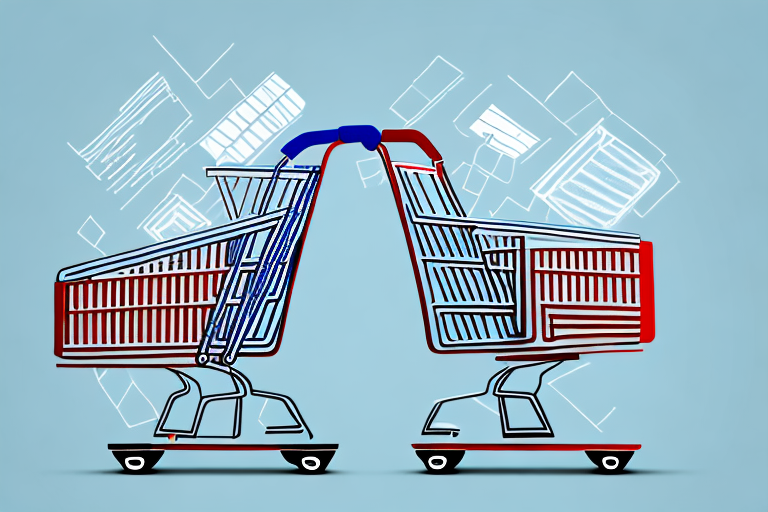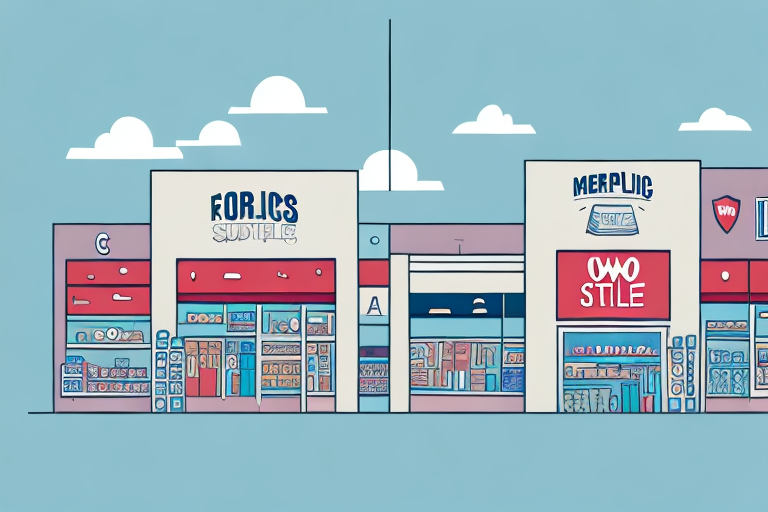In recent exciting news for consumers, Kroger and Target have announced a merger that promises to shake up the retail industry in a big way. The two companies are already major players in the industry, with Kroger ranking as the largest supermarket chain in the United States and Target being a popular destination for shoppers looking for trendy and affordable products. In this article, we'll take a close look at what the Kroger and Target merger means for consumers, the motivations behind the merger, and what we can expect to see in terms of changes to product offerings, store locations, and more.
Overview of the Kroger and Target Merger
The Kroger and Target merger is a major deal that will combine two of the nation's largest retailers. The announcement has generated a lot of buzz in the retail industry, and many are curious about what this merger will look like in practice. At this time, details on the specifics of the merger are still emerging, but what we do know is that the merger will involve the two companies joining forces to create a new entity that will hopefully be even more successful than they were on their own.
One potential benefit of the Kroger and Target merger is the ability to streamline operations and reduce costs. By combining resources and eliminating redundancies, the new entity may be able to operate more efficiently and offer better prices to customers. However, there are also concerns about the potential impact on jobs and competition in the retail industry. As the details of the merger continue to unfold, it will be interesting to see how these issues are addressed and what the future holds for both companies.
Why Did Kroger and Target Decide to Merge?
The Kroger and Target merger is a strategic move for both companies. In part, the decision to merge was driven by the highly competitive nature of the retail industry. With increased competition from online retailers like Amazon, traditional retailers like Kroger and Target have had to continually innovate to remain relevant. By merging, Kroger and Target are hoping to create a company that is better positioned to compete in this ever-changing market.
Another factor that contributed to the decision to merge was the desire to increase efficiency and reduce costs. By combining their resources, Kroger and Target can streamline their operations and eliminate redundancies, which can lead to significant cost savings. This can also allow them to invest more in areas like technology and marketing, which are crucial for staying competitive in the retail industry.
Furthermore, the merger can also provide opportunities for both companies to expand their reach and customer base. Kroger has a strong presence in the grocery industry, while Target is known for its retail stores and e-commerce platform. By joining forces, they can leverage each other's strengths and potentially enter new markets or offer new products and services to their customers.
Benefits of the Kroger and Target Merger for Consumers
While the merger is primarily aimed at helping Kroger and Target better compete in the retail industry, there will also be several benefits for consumers. Some experts predict that the merger could lead to lower prices and more competitive deals at both Kroger and Target stores. Additionally, the merger could help to streamline operations and improve customer service, making it easier for consumers to shop and find the products they are looking for.
Another potential benefit for consumers is the increased availability of products. With the merger, Kroger and Target will have access to each other's suppliers and distribution networks, which could result in a wider range of products being offered at both stores. This could be especially beneficial for consumers who live in areas where one store may not have a particular product, but the other store does. The merger could also lead to more exclusive products and collaborations between the two companies, providing consumers with unique and exciting shopping experiences.
Potential Challenges for Consumers after the Kroger and Target Merger
Although there are many potential benefits to the merger, there are also some potential challenges that consumers may face. One possible concern is that the merger could result in reduced options for consumers, as some products may be discontinued or replaced as a result of the merger. Consumers could also face new challenges when it comes to product availability, particularly if the merger leads to changes in store locations or supply chains.
Another potential challenge for consumers after the Kroger and Target merger is the possibility of increased prices. With fewer competitors in the market, the merged company may have more power to raise prices without fear of losing customers. This could be especially concerning for low-income consumers who rely on affordable options.
Additionally, the merger could have an impact on the workforce. There may be job losses or changes in employee benefits and working conditions as the two companies integrate. This could have a ripple effect on the local economy, particularly in areas where Kroger and Target are major employers.
Impact of the Kroger and Target Merger on Prices
One of the most significant potential impacts of the Kroger and Target merger is its effect on prices. While it's not yet clear exactly how prices will be affected, many experts predict that the merger will lead to increased competition between the two companies, which could drive prices down and lead to better deals for consumers. At the same time, it's possible that prices could rise in some areas where the newly merged companies have a greater-than-average market share.
Another potential impact of the Kroger and Target merger on prices is the effect on suppliers. With the merger, the newly formed company will have more bargaining power with suppliers, which could lead to lower prices for the company and potentially lower prices for consumers. However, this could also lead to smaller suppliers being squeezed out of the market, as they may not be able to compete with the larger, merged company.
It's also worth considering the impact of the Kroger and Target merger on online prices. Both companies have a significant online presence, and the merger could lead to increased competition with online retailers such as Amazon. This could lead to lower prices for consumers, as the newly merged company seeks to gain market share in the online space. However, it's also possible that the merger could lead to higher prices for some products, particularly if the newly merged company decides to focus on higher-margin products in order to increase profitability.
Changes in Product Offerings after the Kroger and Target Merger
Another major question on consumers' minds is what changes we can expect to see in product offerings after the merger. While it's too soon to say for certain, we can expect that there will be some changes to the types of products that are available at both Kroger and Target stores. For example, the new company may choose to focus on certain product categories where they see the most potential for growth and profitability. Additionally, we may see more private label brands being introduced or expanded as a result of the merger.
Effect of the Kroger and Target Merger on Store Locations
One significant change that could result from the merger is the closing or consolidation of some store locations. With two major retailers combining forces, it's possible that some stores will be closed or converted to other uses. Consumers should be prepared for potential changes in their local shopping options, but Kroger and Target have both emphasized that they plan to maintain a strong presence in communities nationwide.
Will the Kroger-Target Merger Affect Rewards Programs?
Another area where consumers may be affected by the merger is in the realm of rewards programs. At this time, it's unclear what changes may occur to existing rewards programs at Kroger and Target, or if the new company will introduce a new rewards program altogether. However, it's possible that consumers could see changes to the ways in which rewards are earned and redeemed, so it's worth keeping an eye out for any announcements from the companies.
How Will Competition Respond to the Kroger-Target Merger?
It remains to be seen how other major players in the retail industry will respond to the Kroger-Target merger. Some experts predict that we may see more mergers and acquisitions as other companies try to keep pace with the new entity. At the same time, other retailers may choose to emphasize their unique value propositions, like the in-store experience or personalized customer service, in order to differentiate themselves from this new competitor.
The History of Mergers in the Retail Industry
The Kroger and Target merger is far from the first time that major retailers have combined forces. Throughout the history of the retail industry, we've seen numerous mergers and acquisitions, many of which have been successful in helping companies improve their competitive position and achieve greater profitability. Some notable examples include the merger between Sears and Kmart, and the acquisition of Whole Foods by Amazon.
Analysis of Other Successful Mergers in Retail Industry
While the Kroger and Target merger is unique in its own way, we can still learn from other successful mergers and acquisitions in the retail industry. Some of the key factors that have contributed to successful mergers in the past include strong strategic alignment between the two companies, a clear vision for the future of the combined entity, and a willingness to be flexible and adaptable as market conditions change.
Expert Opinions on the Future of Retail Industry after this Mega-Merger
Many experts are weighing in on what the future may hold for the retail industry in the wake of this mega-merger. Some predict that we could see a resurgence of brick-and-mortar stores as the new company tries to differentiate itself from online retailers. Additionally, we may see greater emphasis placed on retail technology and automation as companies try to improve their efficiency and better serve consumers' needs.
What Can We Expect Next from Kroger-Target?
As the details of the Kroger-Target merger continue to emerge, consumers and industry insiders alike will be watching closely to see what happens next. Some possible next steps for the new company include further consolidation of store locations or the introduction of new product categories or brands. Whatever happens, the retail industry is sure to be impacted in large and significant ways.
Key Takeaways for Consumers after the Kroger-Target Merger
As the Kroger-Target merger continues to unfold, here are some key takeaways that consumers should keep in mind: the merger is primarily aimed at improving competitiveness and profitability for the two companies, but that also means there may be changes to product offerings, store locations, and rewards programs. Prices may be affected in many ways - they could go up, but they could also go down. Overall, it's an exciting time for the retail industry, but it's also important to be aware of potential changes and to stay informed about how the merger will affect your shopping experience.



















